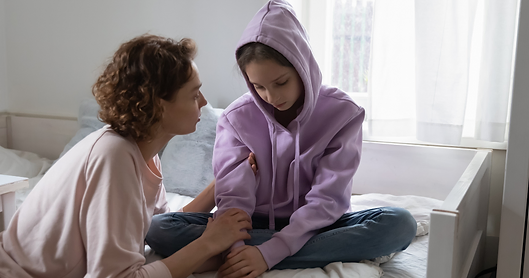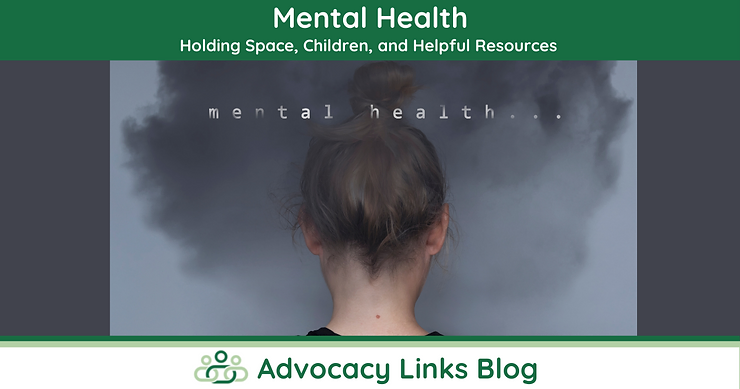Despite the strides and awareness that have been brought to mental health issues over the years, stigma still exists. We live in an era that is often blind to misinformation and focused on projecting images of positivity. For people who are struggling with mental health concerns, openly discussing their challenges can easily lead to unsolicited advice from others that is generally well-meaning, but hurtful nonetheless.
The prevalence of mental health challenges within our society is vast. If you have not experienced mental health issues, there is a strong likelihood that you have someone close to you that has. No one LIKES or enjoys talking about mental illness or the emotional and physical tolls that it can inflict upon an individual, but just because something is uncomfortable to talk about, doesn’t mean that it should be avoided.
You won’t often see the intimate details of people’s mental health struggles on social media and many people don’t want to talk about it over lunch. When you do see or experience someone sharing their experience, always be kind. It takes a brave individual willing to be vulnerable while experiencing the pain and exhaustion of mental health concerns – to speak up and help shed light on the darkness in which many with mental illnesses feel trapped.
HOLDING SPACE & SUPPORTING MENTAL HEALTH

The idea of “holding space” for others is something that needs more attention, especially regarding mental health.
“Holding space” means being physically, mentally, and emotionally present for someone. It means putting your focus on someone to support them as they feel their feelings.” (That quote came from this article on Holding Space.) It creates a judgment-free space for people struggling to communicate and express their feelings, without someone trying to solve their problems.
This can be incredibly difficult. We want the people we care for and who confide in us to feel better. We want them to seek help and overcome the things that are weighing them down, but holding space for someone isn’t about solving their problems. It does offer something that can be incredibly difficult for people with mental health concerns to find: a neutral and open place to discuss their struggles without the added pressure of having to defend, justify, or explain themselves. This is ground zero in finding a way to support someone with mental illness.
CHILDREN & MENTAL HEALTH

When discussing mental health, children are often overlooked in the conversation. They may not understand that the things they are experiencing are out of the ordinary, or they may not be able to identify or verbalize the things they are feeling. Half of all mental health disorders show their first signs before a person turns 14 years old and 3 out of 4 mental health disorders begin before the age of 24. (Mental Health Myths/Faces From MentalHealth.gov) Mental health supports for children do exist, but they can be challenging to find and access. Doctors may be hesitant to take reports from children or parents seriously, and there is a lot of caution and controversy surrounding the use of medication before the age of 18. Therapy and Counseling are always good options to consider, but if you feel that your or your child’s concerns are not taken seriously, always seek out a second opinion.
This is a blog post for the Cincinnati Children’s Hospital Blog: How To Do Mental Health Check-Ins With Your Kids
There ARE mental health supports available to children. Aside from investigating local mental health organizations that support children, there is a program called Child Mental Health Wraparound Services. Wraparound services function on the principle that helping youth with a mental health crisis involves identifying their unmet needs and building on their strengths.
There are two ways to help your child access these services:
- Advocacy Links will soon be providing Wraparound Support Services to children who meet Medicaid eligibility (See the state website on this service HERE). We will be sharing more about this service soon!
- For children who do not meet Medicaid eligibility, the Indiana Department of Child Services offers support through the Children’s Mental Health Initiative. (You can find information on this program HERE.)
MENTAL HEALTH RESOURCES

There are so many places to go to learn more about mental illness, and there have been several stealthily tucked away among the previous sections of this article.
You can find statistics, learn about individual disorders to help you understand your struggles or to give yourself a deeper understanding of what someone else is going through, and find emergency contacts if you or someone you know is in crisis.
- FOR PEOPLE SEEKING HELP Visit this page with the CDC for numbers to helplines or to find treatment: https://www.cdc.gov/mentalhealth/tools-resources/individuals/index.htm
- FOR WARNING SIGNS Visit this page at MentalHealth.gov https://www.mentalhealth.gov/what-to-look-for
- TO LEARN MORE ABOUT DIFFERENT MENTAL HEALTH CONDITIONS Visit Mental Health America https://mhanational.org/MentalHealthInfo
- FOR NEWS, EVENTS, SCIENTIFIC FINDINGS Visit the National Institute of mental health https://www.nimh.nih.gov/news
- FOR BASICS ON CHILD MENTAL HEALTH WRAPAROUND Visit the National Wraparound Initiative https://nwi.pdx.edu/wraparound-basics/
Also, please note, that each of these websites offers significantly more than what has been highlighted here. If you’re looking for something else, or want a couple of different resources, many of these sites provide much more information.
We want to encourage you also to be aware of where you are getting your information and actively seek out professional and reliable organizations and individuals when you are looking for resources. Information can be easy to find, but often the most accurate and reliable information comes from mental health and medical professionals.

